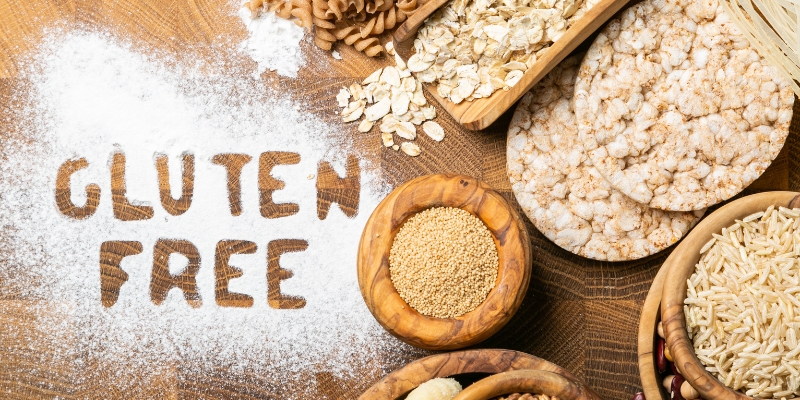Gluten has been a topic of numerous health and nutrition discussions. The protein compound gives dough flexibility, making it essential for bread and other baked foods. Gluten-free diets and products have grown in popularity. Some people must avoid gluten due to health concerns like celiac disease or non-celiac gluten sensitivity, but others question whether it's healthy. This article examines gluten and whether it may coexist with a "healthy" diet.

Understanding Gluten:
Understanding gluten is crucial to understanding its role in our diets. The cereals rye, barley, and wheat contain gluten, a protein compound comprising gliadin and glutenin. It gives dough flexibility and rise, making it essential for baking. This gives bread its lovely texture and structure. Gluten stabilizes and thickens several foods besides bread. As celiac disease and non-celiac gluten become more common, gluten has become contentious.
Gluten creates an allergic reaction that harms the small intestinal lining in celiac disease. Gluten must be avoided forever to prevent serious health issues. Non-celiac gluten sensitivity cannot produce an autoimmune reaction but may cause bloating, headaches, and exhaustion from gluten ingestion. Some have good reasons to avoid gluten, while others may wonder whether they should. We must know our bodies, our goals for wellness, and the more significant implications of our food.
Gluten and Health:
Due to the growing understanding of celiac syndrome and non-celiac allergy to gluten, gluten's health effects are of interest. Celiac disease is a severe gluten intolerance. Small quantities of bread may cause an immunological reaction in celiac disease, harming the small intestinal lining. Nutrient malabsorption, intestinal difficulties, and other health complications might result. Celiac state patients must follow a gluten-free diet to control their illness.
Nevertheless, gluten sensitivity, among others, presents multiple challenges. It doesn't entail an immunological reaction like celiac disease but may cause many symptoms. Bloating, headaches, weariness, and GI discomfort are examples. Gluten-containing foods may cause these symptoms in non-celiac gluten sensitivity, even without an autoimmune reaction. However, gluten sensitivity among people who are not celiac is uncommon and challenging to diagnose. However, eliminating gluten could be helpful to those with symptoms. We'll discuss whether gluten may be part of a balanced diet for those without coeliac-related disorders alongside how to choose foods in the following sections.
Gluten is a Healthy Diet:
Gluten may be suitable for those without celiac disease and non-celiac gluten sensitivity. Many gluten-containing foods, such as whole grains, are nutritious. Whole grains like rye, barley, and wheat give fiber, vitamins, and minerals. Adding them to a balanced diet helps enhance heart health, weight, and digestion. These grains may improve your diet by substituting refined grains like bread, pasta, and cereals.
Variety and delight are also possible with gluten-containing meals. Breads, spaghetti, and baked products are typical in many cultures and may enhance meals. High-quality, whole-grain alternatives are healthier than refined ones, so pick them when available. Choosing gluten-containing and gluten-free grains may diversify your diet and give you a range of nutrients.
Gluten-Free Diets and Considerations:
Gluten may be part of a healthy diet for individuals without particular illnesses. However, celiac disease and non-celiac gluten sensitivity need gluten-free diets. Such situations need stringent gluten-free diet adherence to avoid health issues. However, a gluten-free diet has risks, so it must be approached carefully. Gluten-free goods may use less nutritious components. This may cause vitamin deficits if not controlled.
Cost, accessibility, and food limitations all make free from gluten living difficult. Gluten-free items can turn out to be more costly and less accessible. As even a bit of gluten may cause symptoms of celiac disease, celiac-free dieters must be alert about cross-contamination. Planning and thinking ahead are essential for gluten-free diets. Patients with special dietary requirements should contact doctors or nutritionists to ensure a healthy diet.
Navigating Food Choices:
Whether you eat gluten as part of a balanced diet or gluten-free for dietary reasons, you must understand gluten-free food options. Learning to read food labels is the first step. Many countries require food labels to include allergies like gluten, which is found in wheat. By looking for "wheat," "barley," or "rye," consumers may determine which items are safe.
Dining out or traveling with gluten restrictions might be difficult. However, restaurant and accommodation workers must know your dietary restrictions to ensure safe and comfortable meals. Many eateries provide gluten-free alternatives and have cross-contamination safeguards. To simplify travel, investigate local cuisine and gluten-free eating alternatives.
Healthcare practitioners and certified dietitians help people with special diets. These experts may provide personalized nutritional advice and monitor consumption to avoid deficits. Whether you're proactively embracing gluten as part of a balanced diet or following a gluten-free regimen, make educated decisions, explain your requirements, and prioritize health and nutrition.

Gluten and Culinary Exploration:
Many see food as not simply nourishment but delight and cultural inquiry. Gluten-containing cereals, including wheat, barley, and rye, are essential in many cuisines. They underpin Italian spaghetti, French baguettes, and Indian naan. Enjoying many flavors and cultures may be possible by eating gluten. It's about enjoying world cuisine's art, not just eating.
Gluten-containing grain experimentation may be informative. Working with various flours, such as whole wheat and spelled, may improve your cooking abilities and culinary knowledge. It's a chance to admire gluten's diversity and explore dish flavor, texture, and heritage. Combine culinary experimentation with sensible nutritional decisions for a harmonic and pleasurable meal.
Gluten-Free Innovations:
Food companies have innovated gluten-free products in recent years. These advancements make it simpler for gluten-sufferers to enjoy many items. Gluten-free flours, baked mixes, and items are more accessible and better. Gluten-free bread and cookies are now almost identical to gluten-containing ones.
Gluten-free products go beyond bread. The company offers gluten-free spaghetti, grain, and snacks. These products are for celiacs, non-celiac gluten sensitives, and other gluten-free eaters. The accessibility and quality of without-gluten choices have greatly enhanced the quality of life for those with special diets. This increase in gluten-free options helps people eat well while following gluten-free diets. It shows the food industry's success in meeting client's various wants and tastes.
Conclusion:
Gluten's role in a "healthy" diet varies on individual circumstances and health problems. Gluten may be part of a healthy diet for those without celiac disorder or non-celiac gluten sensitivity. Gluten-containing foods are nutritious and provide variety to meals.
People with celiac disorder or non-celiac wheat sensitivity must consume gluten-free to be healthy. These people can not prevent illnesses by eating gluten-free.
Individual health objectives and nutritional needs should guide diet choices. Whether gluten is part of a balanced diet or excluded due to special requirements, food choices should prioritize health, balanced nutrition, and pleasure. People may tailor their diet to their needs and health objectives by knowing gluten and making educated choices.







